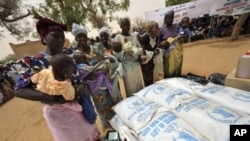Ending the cycle of hunger in Africa's Sahelian region means reinvesting in local agriculture. VOA reports from Niger, where another year of poor rains has left 60 percent of the population facing severe food shortages.
At the edge of the Sahara desert, Niger has cycles of drought, locust infestations, and sudden floods that have caused food insecurity and malnutrition throughout the years - in the early 1970's, the mid 1980's, 2005, and today.
Rain-fed agriculture and livestock production make up nearly half the country's economy. So when rains fail and cereal production falls, few families have enough food to last between harvests.
This year, the government says more than seven million people do not have enough food. The United Nations World Food Program is targeting more than 1.5 million people for general food distribution and 500,000 children under the age of six for specialized therapeutic feeding.
But getting to the root of the problem and ending the cycle of hunger by boosting agricultural production is far more difficult than handing out rice and beans.
"When there is an emergency, usually the flow of contributions is more quick, Richard Verbeeck, head of World Food Program operations in Niger said. "The level is different. Now if we turn to longer-term development activities, it is sad to say that the interest is going down, and the investments in longer-term activities is not the same or what should be expected. And I must say that within the U.N. system in Niger, that is one of the strong messages that we gave to the donors."
Boubacar Bello is president of Niger's national Chamber of Agriculture. He says people are grateful for outside assistance but realize it does not make them any more food secure.
Bello says food assistance is medicine for the disease. It does not cure the disease itself. To truly cure the disease and have food security, he says there must be more water and planting methods better adapted to the country's climate as well as the distribution of fertilizers to small-scale farmers who account for the bulk of the country's agriculture.
Bello says each year there is less and less rain. Niger has groundwater, but it can be 100 meters or 120 meters below the surface, and that cannot be reached by traditional methods. Bello says there should be the teaching of more modern, organic methods of livestock production. Medicine alone is not enough to cure the disease. It must be attacked at the source.
Ibro Adamou, director of soil restoration at Niger's Ministry Against Desertification says the government is trying to use simple, appropriate technology to rehabilitate degraded soil and enrich the top soil for cultivation. There are also projects to prevent the desert from encroaching on lands already being used for agriculture.
Adamou says there are also agro-forestry programs in Niger to combat desertification which help local farmers improve the fertility of their soil and boost food security by filling stockpiles of grain used to guard against shortages, while generating local revenue for people to use to carry their families over through the lean seasons.
World Food Program's Verbeeck says he has no doubt where development assistance can be best spent to stop this cycle of hunger. "Agriculture. Agriculture, livelihoods, something sustainable that can address the root problems in Niger. And it is about time there is a coalition to do that," he said.
The military government that took power here in February says it is determined to improve agricultural production. Towards that end, it is sending a delegation to Brussels next week to ask the European Union to renew $450 million of development assistance that was frozen during the previous government of President Mamdou Tandja.




